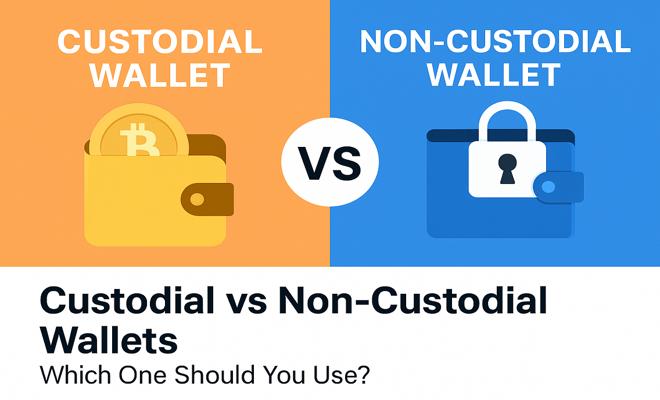
Custodial vs Non-Custodial Wallets: Which One Should You Use?
As cryptocurrency adoption continues to grow worldwide 🌍, more people are diving into the world of digital assets. But before you can start trading or investing, you’ll need a place to store your crypto — and that brings us to crypto wallets. One of the biggest decisions you’ll face is choosing between a custodial wallet and a non-custodial wallet. Each comes with its own pros, cons, and risks.
In this article, we’ll explore the differences between custodial and non-custodial wallets, help you understand how they work, and guide you in choosing the right one based on your goals and preferences. 🧠💡
🔍 What Is a Crypto Wallet?
A crypto wallet is a digital tool that allows you to store, send, and receive cryptocurrencies like Bitcoin (BTC), Ethereum (ETH), and others. But unlike a traditional wallet that holds physical cash, a crypto wallet stores your private keys — the codes that allow you to access your digital funds on the blockchain. 🔑
💼 What is a Custodial Wallet?
A custodial wallet is one where a third party — usually a cryptocurrency exchange or service provider — holds your private keys on your behalf. This is similar to a bank account, where the institution has control over your funds, but allows you to access and use them.
✔️ Common Custodial Wallets Include:
- Binance Wallet
- Coinbase Wallet (exchange-based)
- Crypto.com App
- Kraken
✅ Pros of Custodial Wallets
- 🔐 No need to manage private keys
- 🖥️ Easy to use, especially for beginners
- 🚀 Fast transactions on the platform
- 🛠️ Usually comes with customer support
⚠️ Cons of Custodial Wallets
- ❌ You don’t own your private keys
- 🚫 Risk of exchange hacks or shutdowns
- ⛔ Funds may be frozen or censored
- 📜 Regulatory risks depending on jurisdiction
🛡️ What is a Non-Custodial Wallet?
A non-custodial wallet gives you complete control over your private keys and your crypto assets. You are the sole owner, which means you are also fully responsible for managing your keys and security.
✔️ Examples of Non-Custodial Wallets:
- MetaMask
- Trust Wallet
- Exodus
- Ledger (hardware wallet)
- Trezor (hardware wallet)
✅ Pros of Non-Custodial Wallets
- 🔑 Full ownership of private keys
- 🚫 No third-party interference or restrictions
- 📲 Greater privacy and censorship resistance
- 💡 Ideal for DeFi, NFTs, and staking
⚠️ Cons of Non-Custodial Wallets
- 🧠 Requires understanding of security and backup
- 📉 If you lose your keys, you lose access forever
- ❗ No customer support if things go wrong
📊 Comparison Table: Custodial vs Non-Custodial
| Feature | Custodial Wallet | Non-Custodial Wallet |
|---|---|---|
| Control of Private Keys | ❌ Third Party | ✅ You |
| Ease of Use | ✅ Very Easy | ⚠️ Requires Knowledge |
| Security Risk | ⚠️ Dependent on Provider | 🔐 Depends on User |
| Access to DeFi/NFTs | ❌ Limited | ✅ Full Access |
| Recovery Options | ✅ Customer Support | ❌ User Responsibility |
🧠 When Should You Use a Custodial Wallet?
Custodial wallets are ideal for:
- 🆕 Beginners just entering the crypto space
- 📈 Traders who make frequent transactions
- 👥 Users who want simplicity and customer support
- 💼 Institutional investors working with regulated platforms
🔓 When Should You Use a Non-Custodial Wallet?
Non-custodial wallets are best suited for:
- 🎯 Long-term investors and HODLers
- 🧑💻 Crypto-savvy users who prioritize privacy and freedom
- 🌐 Users participating in DeFi, NFTs, and Web3
- 🛡️ Those who want full control of their assets
🔐 Not Your Keys, Not Your Coins
One of the most famous sayings in the crypto world is: “Not your keys, not your coins.” It highlights the risk of leaving your assets under someone else’s control. While custodial wallets offer convenience, they also come with trust-based risks. By using a non-custodial wallet, you are embracing the original ethos of crypto — decentralization and financial sovereignty. 🌍🧠
💡 Tips for Wallet Security
- 📋 Always backup your seed phrase securely and offline
- 🔒 Use strong passwords and enable 2FA
- 💾 Consider hardware wallets for large holdings
- 🚫 Never share your private key with anyone
- 📵 Don’t store keys on your phone or email
📌 Final Thoughts
Choosing between a custodial and non-custodial wallet comes down to your personal needs, experience level, and how much responsibility you’re willing to take. Beginners may feel more comfortable with custodial services, while advanced users and privacy advocates will prefer the control of a non-custodial wallet.
For maximum flexibility and security, many users opt for a hybrid approach: using a custodial wallet for small, frequent transactions, and a non-custodial wallet (such as a hardware wallet) for long-term storage. 🔄
🧭 Still unsure? Explore more wallet guides and comparisons right here on BitMedia24!